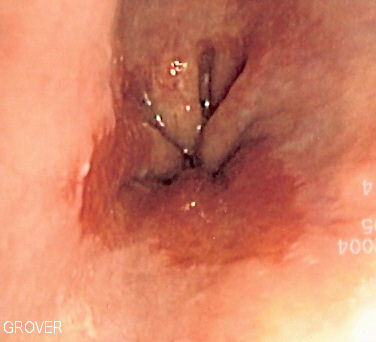Oesophageal cancer, cancer of the foodpipe or gullet, is a growing problem in the UK. Not only are rates rising dramatically, but survival is often very low, mainly because the cancer isn't spotted until a very late stage when it's harder to treat.
 Now a new - but very simple - technique developed by Dr Rebecca Fitzgerald and her team at Cambridge University could help to identify those at greatest risk, so they can be offered preventive treatment.
Now a new - but very simple - technique developed by Dr Rebecca Fitzgerald and her team at Cambridge University could help to identify those at greatest risk, so they can be offered preventive treatment.
It all centres on detecting a condition called Barrett's oesophagus. This is a pre-cancerous condition usually caused by acid from the stomach coming back up into the gullet - you may know it as heartburn, and it's experienced by around one in ten of the population. Then around one in ten of those will develop Barrett's oesophagus.
The acid causes the cells of the oesophagus to change, becoming more like stomach cells. This also increases the likelihood that they'll turn into cancer, and around one in a hundred people with Barrett's oesophagus will go on to get oesophageal cancer.
Currently, doctors use a technique called endoscopy to look for Barrett's oesophagus in people with chronic heartburn. This involves having to go to hospital, and have a telescope put down your gullet. It's expensive for the NHS and inconvenient and uncomfortable for people. But Dr Fitzgerald have developed a simple technique to get round this.
At the GPs surgery, a person simply swallows a little capsule on a string, which then expands in their stomach into a little sponge ball. After a few minutes, a nurse pulls the sponge back up, which removes a sample of cells from the oesophagus. These can then be examined under the microscope for signs of Barrett's oesophagus.
A survey of the technique showed that patients far prefer the sponge on a string to endoscopy, and as mentioned already, it can be easily done in a GPs surgery.
If signs of Barrett's oesophagus are found, then patients can be offered preventive treatment, such as radiofrequency ablation, which can get rid of dodgy cells and prevent the development of oesophageal cancer. And there's also research to find out if aspirin and anti-acid drugs can helps to prevent the development of oesophageal cancer in these people.
Although the technique still needs some more work, we could see it in GPs surgeries in the next five years or so, and hopefully it will make a big impact on rising rates of oesophageal cancer.
References
- Previous Gecko Glue
- Next Giant-eater cells key to fat-diabetes link










Comments
Add a comment